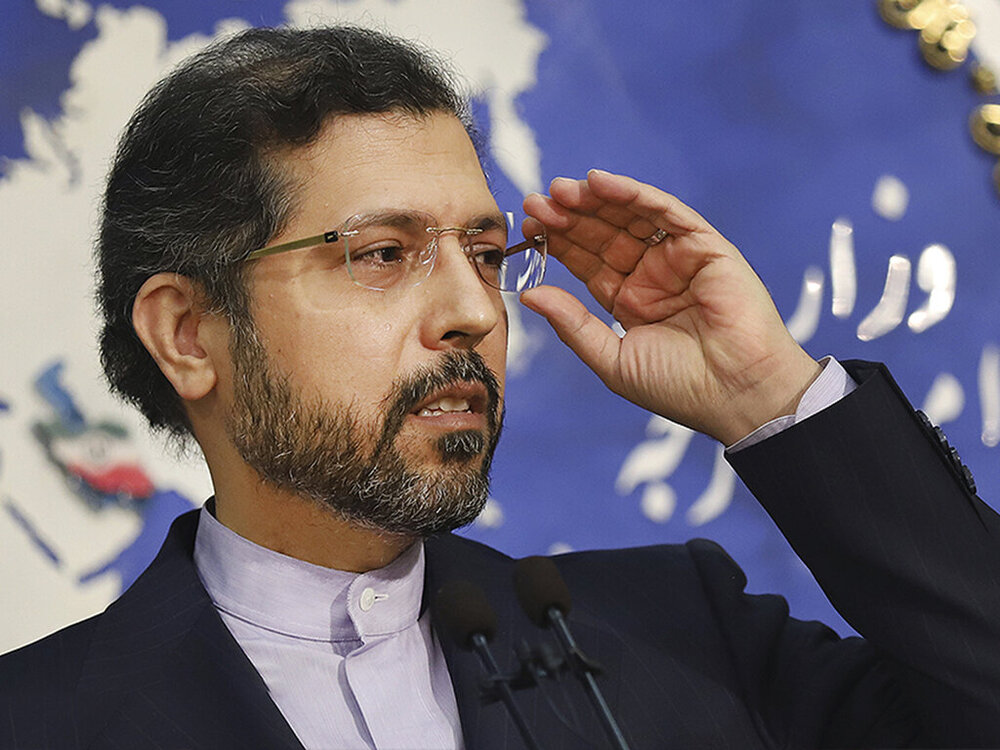Foreign Ministry: We will not back down from our red line in Vienna

TEHRAN — The Foreign Ministry spokesman said on Monday the after the return of Iran’s top negotiator Ali Bagheri Kani from Tehran to Vienna, the Iranian delegation submitted its proposals on the remaining issues in writing to the P4+1 (Russia, China, France, Britain and Germany).
“The United States cannot see different results with the same policies. If they want to see different results, naturally they should take different action,” Saeed Khatibzadeh told his weekly press conference.
“In the framework of the negotiations, all sanctions that are inconsistent with the other parties’ commitments and the economic benefits must be lifted,” he added.
He said the scope and number of issues to be resolved have been greatly reduced but the remaining issues are the most difficult ones.
“The definite interests of the Iranian people, Iran's fundamental rights and the country's nuclear achievements are all protected in these negotiations and will remain as an honor for this generation and future generations,” he noted.
He went on to say that seeking fundamental rights is a principle.
“If we consider other two or three issues of the other party's commitment, we will enter the final phase. We are still waiting for the decisions of Europe and the United States, and we have not yet seen that will,” the diplomat noted.
On the issue of receiving guarantees that the JCPOA will not be violated again, he said, “Legal, political and economic guarantees are guarantees under which initiatives and plans have been made. Negotiations on economic guarantees are also very specific and difficult.”
He added that one of the most important guarantees that Iran announced in the negotiations and seriously pursued is the guarantee that Iran “inherently” considers for itself and that is the rapid reversibility of its nuclear plans.
With regard to holding direct talks with the U.S., he said that the U.S. has “repeatedly called for direct talks and want to raise some issues in direct negotiations with Iran.”
Khatibzadeh said that if the Europeans are looking for an agreement and time is important to them, they should know that they cannot raise random issues and every time that they enter the negotiation room, raise a post-JCPOA issue without presenting an initiative.
They think they cannot show flexibility and just make nuclear demands from Iran without helping Tehran to reap economic benefits from the Joint Comprehensive Plan of Actions (JCPOA), the official name for the nuclear deal.
“France, as well as other European countries present at the talks, are well aware of our points and we advise them to focus on the remaining two or three issues in the negotiation room and spend their time and energy on this issue,” he suggested.
To reach a meaningful agreement, the Foreign Ministry spokesman added, the Europeans must also stop discussing points in the negotiations room in media.
The spokesman also said the Supreme National Security Council (SNSC) is in charge of the negotiations in Vienna, and the leaders of the three branches of government, including the parliament speaker, are members of the SNSC and are aware of the details of the discussions.
He added, “In the last one or two months, the foreign minister appeared several times in the Majlis (parliament) and in the National Security and Foreign Policy Committee of the Majlis and presented a report on these talks. Mr. Bagheri has also spoken to members of the Majlis in this regard. We have not and will not back down from our red line during the Vienna talks.”
